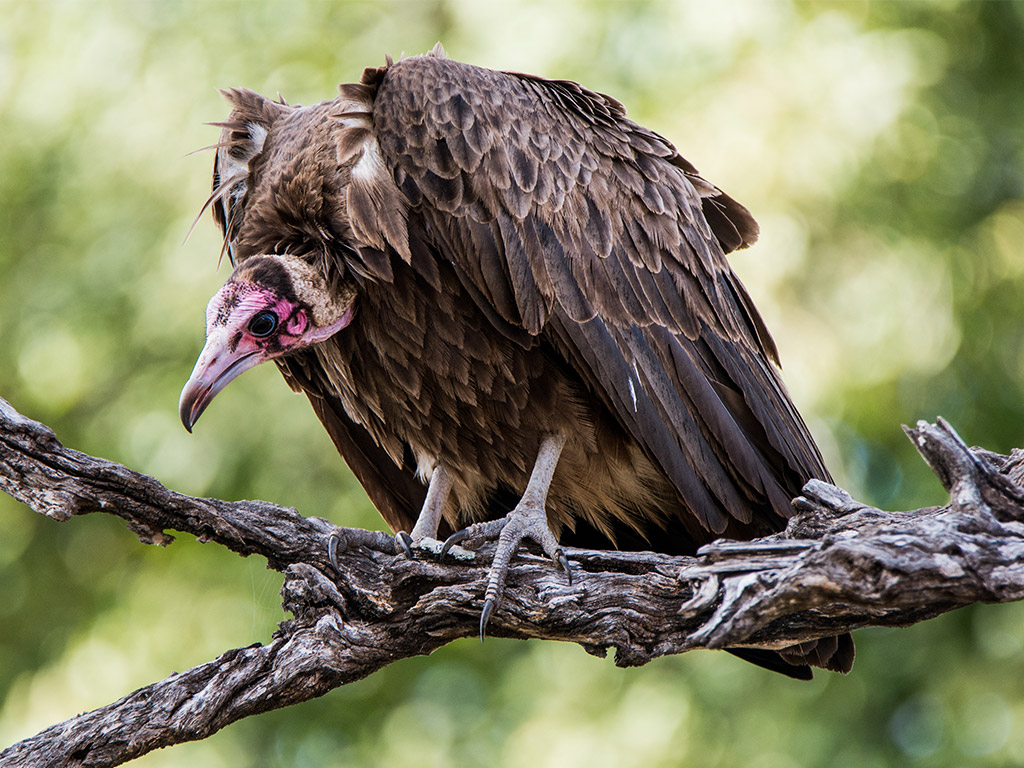
Over 2,000 vultures (updated from 1,000 as previously reported) have reportedly died in various incidents across Guinea-Bissau, due to poisoning related to belief-based use. The situation now amounts to the biggest ever mass vulture mortality event in the world. Information provided by the Vulture Conservation Foundation.
Editorial update 21 April 2020:
The latest estimate of critically endangered hooded vultures to have died from poisoning across Guinea-Bissau is in excess of 2,000. Evidence collected during the field missions organized by the authorities suggests that the vultures have been killed deliberately using poisoned baits. Reports from witnesses corroborate that vultures were poisoned intentionally, using poison baits placed around villages so that vulture parts could be collected for belief-based use (ritual use), with demand related to the country’s political instability. In some parts of Africa, some communities believe that possession of vulture heads is thought to bring good fortune or even special powers. In Guinea-Bissau at least 200 of the poisoned vultures have been found without their heads. Additionally, there have been reports that high demand for vulture body parts from neighbouring countries may have played a role.
To help confirm the cause of death, vulture carcasses have been collected and sent to Lisbon with one of the last planes that flew out of Guinea-Bissau before the global lock-down imposed by the COVID-19 pandemic and toxicological analysis are now being carried out in Lisbon university.Editorial update 6 March 2020: The number of vulture mortalities is now nearing 1000 individuals throughout Guinea-Bissau – an unprecedented and disastrous blow to the already plummeting populations of vultures in West Africa. The dead vultures have generally been found in groups on the outskirts of towns spread throughout the country, with numbers around 300-600 in Bafatá, 400-493 in Gabú, 40-96 in Bambadinca and 23 in Quebo. As was initially the case, most of the vulture casualties appear to be hooded vultures and the carcasses were incinerated immediately to minimise the potential contamination. Disconcertingly, the cause remains unidentified, though poisoning is still a distinct possibility, and the situation has been made all the more challenging due to political instability throughout Guinea-Bissau.
There have been no mortalities reported over the past few days which may be a positive sign, but the Vulture Conservation Foundation and the IUCN’s Vulture Specialist Group continue to offer their support to the local authorities.
Vulture poisoning is one of the main threats facing vulture populations throughout Africa, and incidents have been known to kill hundreds of vultures at a time. With further reports of dead vultures coming in from other regions of Guinea-Bissau, the reason behind the deaths remains to be established.

A quick response team was mobilised to incinerate the carcasses of the dead vultures to minimise the risk of spread of either poison or pathogen and the World Health Organisation office in Guinea-Bissau is involved in case there is a potential risk of a public health threat.
Africa’s vulture populations have already declined by an average 62% over the past three decades — with seven species crashing by 80%. Most of the afflicted vultures appear to be hooded vultures, which are considered to be Critically Endangered in West Africa, and this incident could have enormous ramifications for their population.
The Vulture Conservation Foundation and the IUCN’s Vulture Specialist Group have both expressed alarm over the incident in Guinea-Bissau and have stressed the urgency of the situation as well as pledging support to the authorities. So far, the reactions of the Guinea-Bissau authorities have been rapid, but the main priority now is to identify the cause behind these widespread vulture deaths.
Read more about Africa’s vulture species here.
To comment on this story: Login (or sign up) to our app here - it's a troll-free safe place 🙂.![]()






